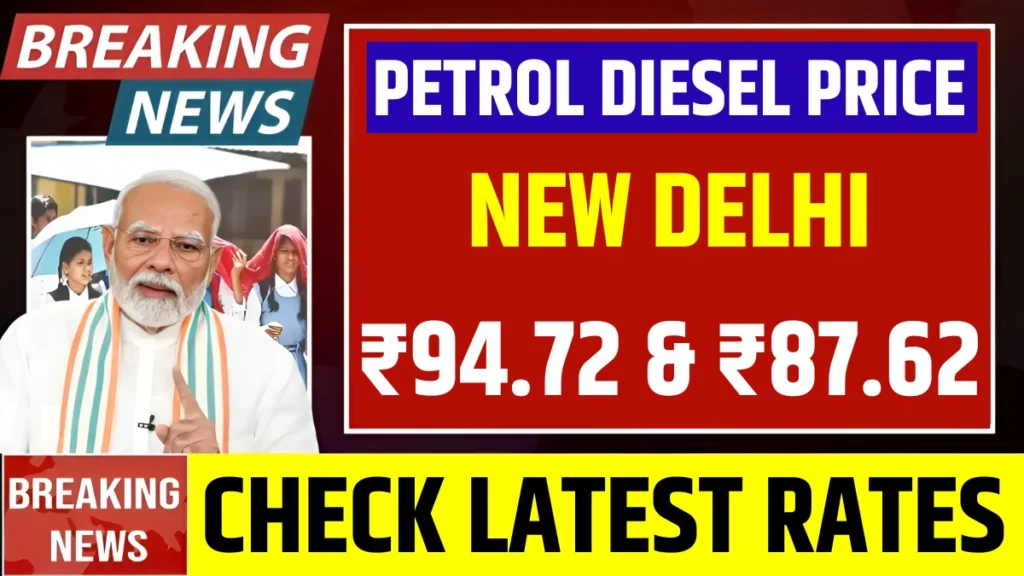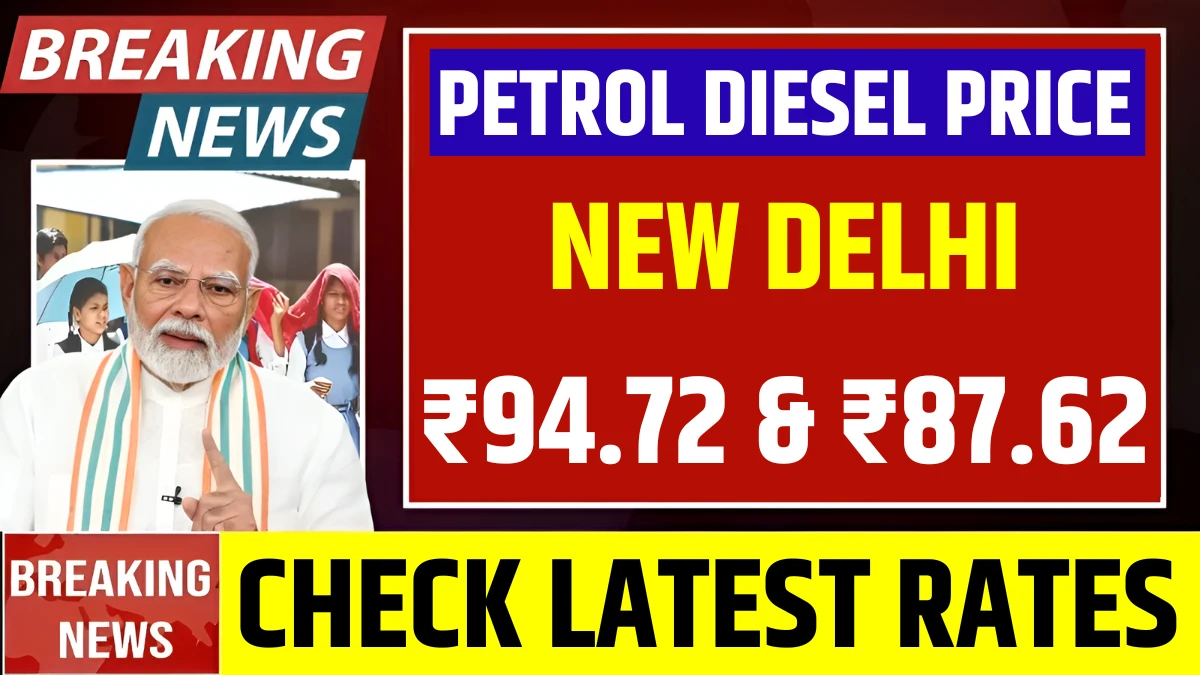Petrol and Diesel Price Update – In India, the prices of petrol and diesel have always been an important topic of conversation. With regular fluctuations based on both domestic and international factors, keeping up with the latest price updates is essential for everyday consumers.
As of the latest update, the price of petrol in New Delhi stands at ₹94.72 per liter, while diesel costs ₹87.62 per liter. This post will explore the key factors that affect fuel prices, the impact of these prices on daily life, and how they influence broader economic trends.

Understanding the Petrol and Diesel Price Trends
Petrol and diesel prices in India are dynamic and change frequently. These fluctuations are primarily influenced by global oil prices, taxes levied by both the central and state governments, and logistical factors involved in the supply chain. The price of crude oil, from which petrol and diesel are derived, can change due to various reasons such as geopolitical tensions, shifts in demand, and fluctuations in the global oil market.
Another significant factor is the foreign exchange rate. Since India imports a large portion of its crude oil, the exchange rate between the Indian Rupee (INR) and the US Dollar (USD) plays a vital role. A weaker Rupee against the Dollar can lead to higher import costs, subsequently raising fuel prices. Similarly, local taxes, including excise duties and state VAT, significantly contribute to the final price at the pump. Fuel prices are also impacted by distribution costs, as the transportation and retailing of petrol and diesel incur additional expenses.
Currently, the price of petrol in New Delhi is ₹94.72 per liter, while diesel is priced at ₹87.62 per liter. These rates are reflective of the latest market trends and regulatory factors in play, and they are subject to change regularly.
Factors Influencing Petrol and Diesel Prices
The most significant factors influencing petrol and diesel prices are the international prices of crude oil, which make up the largest portion of the cost. Crude oil prices are heavily affected by global supply and demand dynamics. If there is a decrease in oil production or disruptions to supply chains, the price of crude oil typically increases, which directly affects the prices of petrol and diesel in India. Conversely, when global supply exceeds demand, prices tend to decrease.
Exchange rates also play an important role in determining fuel prices. When the value of the Indian Rupee falls against the US Dollar, the cost of crude oil imports rises. This increase in import costs is often passed on to consumers in the form of higher fuel prices.
Taxes imposed by the government also contribute significantly to the overall price of petrol and diesel. The central government charges excise duties, while state governments impose VAT. Both these taxes make up a substantial part of the cost that consumers pay at the fuel pump. These taxes are often adjusted based on market conditions and economic priorities, which can either alleviate or exacerbate the burden of rising fuel prices.
In addition to taxes and international factors, the cost of transporting and distributing the fuel within the country also affects the price. The logistics involved in delivering crude oil to refineries and then distributing the finished product to retail outlets can incur significant costs, especially during periods of supply chain disruptions or other logistical challenges.
Current Petrol and Diesel Rates in New Delhi
As of the most recent update, petrol in New Delhi is priced at ₹94.72 per liter, while diesel is priced at ₹87.62 per liter. These rates reflect the complex interplay of global oil prices, exchange rates, and domestic taxes. Given the volatility of crude oil prices and the fluctuation of the Indian Rupee, these rates can change from day to day, depending on the prevailing market conditions.
Fuel prices are typically higher in metropolitan cities like New Delhi due to various factors such as transportation costs, higher taxes, and increased demand. However, prices can vary significantly across different states, as each state levies its own VAT, which can result in price discrepancies even within the same country.
How Petrol and Diesel Prices Affect the Common Man
The rise in fuel prices is felt by almost every individual, as petrol and diesel are essential for daily transportation. Whether commuting to work, running errands, or using public transport, the cost of fuel impacts everyone’s budget. As fuel prices go up, the amount of money required to fill up a vehicle or power a transportation system also rises, forcing consumers to spend more on fuel.
The ripple effects of rising fuel prices go beyond just transportation. Goods and services, from groceries to electronics, often see price increases as a result of higher logistics costs. Businesses that rely on transportation to move goods may raise prices to cover these additional expenses, leading to inflationary pressures across the economy.
Moreover, individuals who rely on private vehicles for commuting are more directly impacted by the changes in fuel prices. With fuel prices rising, many may find it more difficult to manage their day-to-day expenses, leading them to alter their travel patterns or seek alternative modes of transportation.
The Government’s Role in Regulating Fuel Prices
While the Indian government no longer directly controls petrol and diesel prices, it still plays an important role in influencing fuel costs through taxation policies. Central excise duties and state-level VAT are the primary means by which the government collects revenue from fuel consumption. When fuel prices rise to unsustainable levels, the government may intervene by reducing excise duties or offering other forms of relief to consumers.
In some cases, the government may also adjust fuel pricing based on broader economic objectives, such as curbing inflation or controlling fiscal deficits. In response to an increase in fuel prices, there are often calls for government intervention, especially from the public and opposition parties. However, balancing fuel price stabilization with the need for government revenue remains a challenge.
Impact of Rising Fuel Prices on Electric Vehicles (EVs)
As fuel prices continue to rise, many consumers are beginning to look at alternative transportation options, such as electric vehicles (EVs). Unlike conventional petrol and diesel vehicles, EVs run on electricity, which is typically cheaper than fuel, and they offer a more environmentally friendly alternative.
The rise in petrol and diesel prices is expected to accelerate the adoption of electric vehicles, as consumers seek to reduce their dependence on traditional fuels. With government incentives, lower operating costs, and growing awareness of the environmental impact of fossil fuels, the EV market is gaining momentum. In addition, many states are rolling out subsidies and support programs for electric vehicle buyers, further driving demand for clean energy alternatives.
Conclusion
The latest petrol and diesel price update in New Delhi shows that petrol costs ₹94.72 per liter, while diesel is priced at ₹87.62 per liter. These prices are a reflection of the complex dynamics of global oil prices, local taxes, and distribution costs. Fuel prices directly affect the daily lives of consumers, influencing transportation expenses and broader economic conditions.
As India continues to grapple with rising fuel costs, the adoption of alternative energy sources like electric vehicles may become a viable solution for consumers looking to reduce their reliance on traditional fuels. However, for the foreseeable future, petrol and diesel will remain integral to India’s transportation system, with their prices continuing to be a significant concern for the common man.
Disclaimer: The information provided in this post is for general informational purposes only. Fuel prices are subject to change based on various factors, and the rates mentioned may not reflect current market conditions.
